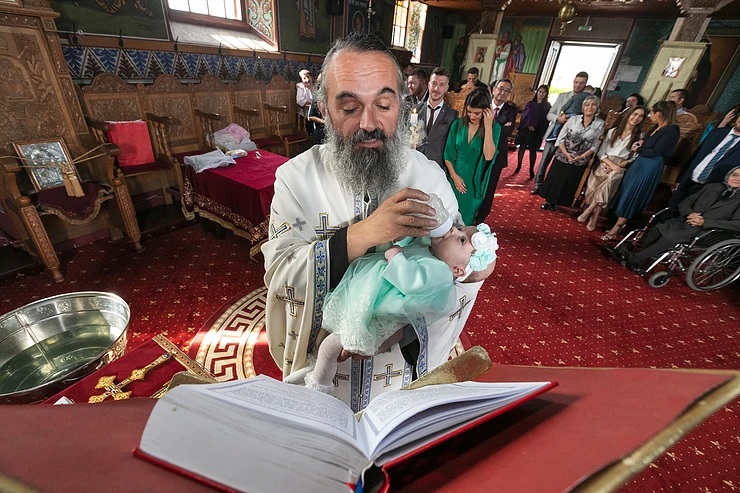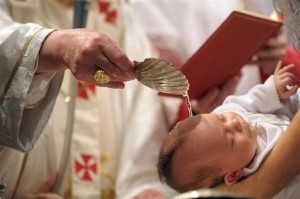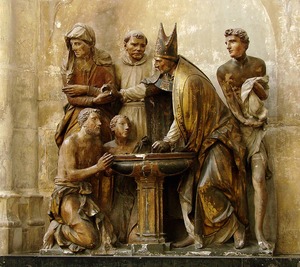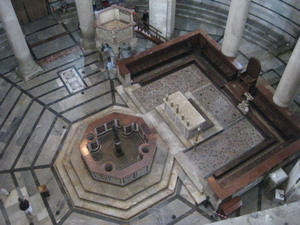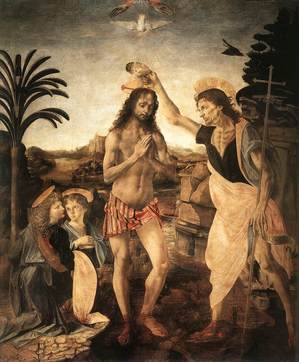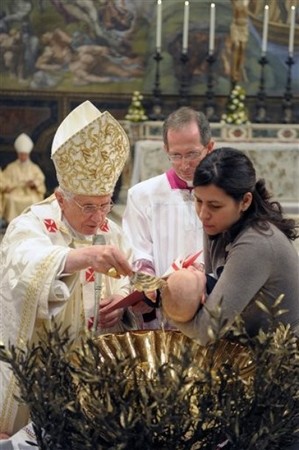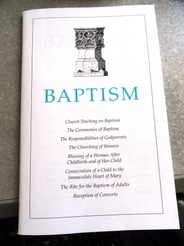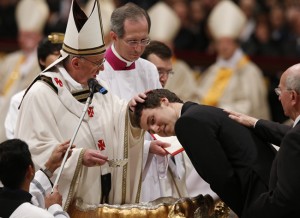 On January 8, 2014, Pope Francis began a new series of Catecheses (teaching) on the seven sacraments for his Wednesday General Audiences. In the coming weeks he’ll explore for us these seven saving moments in a Chrsitian’s life. Given that today’s feast in the Novus Ordo Mass, the Baptism of the Lord, I think it is appropriate to give for our consideration what the Holy Father developed for us with regard to our Catholic sacramentality.
On January 8, 2014, Pope Francis began a new series of Catecheses (teaching) on the seven sacraments for his Wednesday General Audiences. In the coming weeks he’ll explore for us these seven saving moments in a Chrsitian’s life. Given that today’s feast in the Novus Ordo Mass, the Baptism of the Lord, I think it is appropriate to give for our consideration what the Holy Father developed for us with regard to our Catholic sacramentality.
It would be good if pastors, the DREs and the faith formation coordinators collate what the last three popes said about the sacraments, and what meaning they have for us today. Certainly this can be done in a booklet form for the sacraments most administered in parishes.
The first teaching is on Baptism, one three sacraments of initiation. Francis gives perspective when he notes that what we understand a sacrament to be has as its historic and coherence the sense that sacraments are grace-filled signs making Jesus Christ’s saving authority and power present in concrete ways. Just like love being concrete, so too, sacraments are concrete actions of the Holy Spirit.
What do we believe about baptism, as a consequence of our Liturgy? Baptism:
- “gives us new birth in Christ,
- makes us sharers in the mystery of his death and resurrection,
- grants the forgiveness of sin,
- and, brings us new freedom as God’s children and members of his Church.”
Moreover, “baptism has changed us, given us a new and glorious hope, and empowered us to bring God’s redeeming love to all, particularly the poor, in whom we see the face of Christ.” Baptism makes us different persons, our life of faith is not the same as a Jew or a Muslim.
In the papal address the Pope gives us some homework. Do you know when your baptism was performed, by whom, and where? That is, when were you brought into communio with God?
The Pope says,
1. Baptism is the sacrament in which our faith is founded upon and which engages us as living members in Christ and in His Church. Together with the Eucharist and Confirmation, they form the so-called “Christian Initiation”, which constitutes as a single, great sacramental event that configures us to the Lord and makes of us a living sign of His presence and His love.
But a question may arise in us: is Baptism truly necessary to live as Christians and to follow Jesus? Isn’t it basically a simple rite, a formal act of the Church to give a name to a boy or a girl? It is a question that may come to us. In this context, it is illuminating what the Apostle Paul writes: “Or don’t you know that all of us who were baptized into Christ Jesus were baptized into his death? We were therefore buried with him through baptism into death in order that, just as Christ was raised from the dead through the glory of the Father, we too may live a new life” (Rom. 6,3-4). Therefore, it is not a formality! It is an act that profoundly touches our existence. A baptized child and a non-baptized child is not the same! A baptized person and a non-baptized person is not the same! With Baptism we come immersed in that inexhaustible source of life that is the death of Jesus, the greatest act of love in all of history; and thanks to this love we can live a new life, no longer at the mercy of evil, of sin and death, but in the communion with God and with the brothers.
2. Many of us do not have the slightest memory of the celebration of this Sacrament, obviously, if we were baptized shortly after birth. I have asked this question two or three times here in the Square. Who here knows the date of their Baptism? Raise your hand! Who knows? Few, eh! Very few. It is important! It is important to know what day you were immersed in that current of salvation of Jesus! Permit me to give you a piece of advice. More than an advice, a homework for today: Today at home search for, ask for the date of your Baptism. And thus you may truly know well that beautiful date of your Baptism. Will you do it? [People: Yes!] I don’t hear enthusiasm. Will you do it? [People: Yes!] Yes! Because it is to know a happy date! Our Baptism! But the risk is to lose the memory of that which the Lord has done in us, the memory of the gift that we have received. We end up considering it as only an event that happened in the past – and not even by our own will, but that of our parents -, that no longer has any effect in our present. We must awaken the memory of our Baptism. Awaken the memory of Baptism. We are called to live our Baptism every day as an actual reality in our existence. If we follow Jesus and remain in the Church, despite our limitations, our weaknesses and our sins, it is precisely by the Sacrament through which we become new creatures and we are reinvested by Christ. It is in virtue of Baptism, in fact, that, free from original sin, we are grafted into the relationship of Jesus with God the Father; that we are bearers of a new hope because Baptism gives us this new hope! The hope of going on the path of salvation for the rest of our life. And nothing and no one can extinguish this hope, because hope does not deceive. Remember this. The hope in the Lord never deceives us. Thanks to Baptism, we are capable of forgiving and to love even those who offend us and hurt us, that we can recognize in the last ones and in the poor the face of the Lord who visits us and comes close to us and with this Baptism helps us to recognize in the face of the needy, in those suffering, even in our neighbor, the face of Jesus. It is a grace of this strength of Baptism.
3. One last important element and I’ll ask a question. Can a person baptize himself? [People: No!] I can’t hear your! [People: No!] Are you sure? [People: Yes!] One cannot baptize himself/herself! No one can baptize themselves! No one! We can ask for it, desire it, but we always have need for someone to confer this Sacrament in the name of the Lord. Baptism is a gift that is given in a context of solicitude and fraternal sharing. Always in history, one baptizes another, and another. It is a chain, a chain of grace. But I cannot baptize myself. I must ask another for Baptism. It is an act of brotherhood, an act of filiation to the Church. In its celebration we can recognize the most genuine features of the Church, which as a mother continues to generate new children in Christ, in the fruitfulness of the Holy Spirit. Let us now ask the Lord with our whole heart to be able to experience evermore, in daily life, the grace that we have received with Baptism. That in meeting us, our brothers may encounter true children of God, true brothers and sisters of Jesus Christ, true members of the Church. And don’t forget your homework for today, which is, to search, to ask, for the date of your Baptism. And as one knows their date of birth, so must they also know the date of Baptism because it is a feast day!

